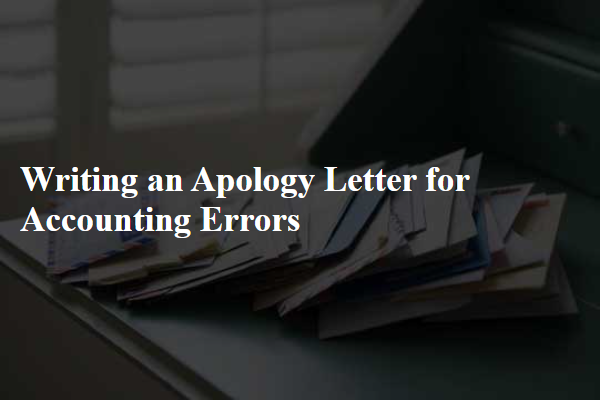
An effective accountant reference letter highlights the individual's expertise in financial management, accuracy in reporting, and compliance with accounting standards to establish credibility. Including specific examples of successful audits, reconciliations, and fiscal planning strengthens the letter's impact. Utilizing clear templates ensures consistency, professionalism, and tailored content that reflects the accountant's unique skills and achievements.
Understanding Accountant Reference Letters
What are the key elements of an effective accountant reference letter?
An effective accountant reference letter should highlight the accountant's qualifications, work ethic, and specific achievements. Including measurable accomplishments and examples of financial accuracy enhances credibility.
How can a reference letter impact an accountant's job application?
A well-written reference letter can significantly boost an accountant's chances by verifying skills and reliability to potential employers. It provides professional validation that complements resumes and interviews.
What tone is recommended when writing an accountant reference letter?
A professional and positive tone establishes trust and respect while emphasizing the accountant's strengths. Clear and concise language helps convey the message effectively.
Which details are essential to include in an accountant reference letter template?
The template should contain the reference writer's contact information, a formal salutation, a detailed endorsement of the accountant's skills, and a closing statement offering further communication. Date and signature improve the letter's authenticity.
How can using templates simplify the creation of accountant reference letters?
Templates provide structured guidance that ensures all critical points are addressed consistently across letters. They save time and maintain a professional format, making reference writing efficient.
Key Elements of an Accountant Reference Letter
An Accountant Reference Letter is a professional endorsement that highlights an individual's skills, work ethic, and experience in the accounting field. It serves as a valuable tool for job applications, career advancement, and client trust building.
- Clarity and Specificity - Include precise examples of accounting competencies and achievements to provide a clear evaluation.
- Professional Tone - Maintain a formal and respectful tone that reflects the accountant's professionalism and reliability.
- Template Structure - Use a well-organized format with an introduction, body highlighting key attributes, and a strong closing recommendation.
Effective Accountant Reference Letters increase credibility and improve career opportunities for accounting professionals.
Situations Requiring an Accountant Reference Letter
An accountant reference letter highlights the candidate's financial expertise, accuracy, and integrity. Employers use these letters to assess skills related to bookkeeping, tax preparation, and financial reporting.
Best practices include providing specific examples of the accountant's responsibilities and accomplishments. Tailoring the letter to the job role increases its impact and relevance for prospective employers.
Legal and Ethical Considerations
An Accountant Reference Letter highlights the candidate's financial expertise, accuracy, and reliability in managing accounts. Best practices include emphasizing specific skills such as budgeting, auditing, and compliance, supported by quantifiable achievements. Using clear, professional templates ensures the letter conveys trustworthiness and competence effectively.
Writing Tips for Clarity and Accuracy
An accountant reference letter highlights an individual's expertise in financial management, attention to detail, and ethical standards. It serves as a credible endorsement for employment, client trust, or professional advancement. Well-structured templates ensure clarity and professionalism, making the recommendation more impactful.
Recommended Formatting and Structure
An accountant reference letter highlights an individual's financial expertise and reliability. It serves as a trusted endorsement for potential employers or clients.
Best practices include specifying the accountant's skills, responsibilities, and achievements. Clear examples of accuracy and professionalism strengthen the letter's credibility.
Do's and Don'ts in Reference Letter Writing
Accountant reference letters are essential documents that validate an individual's financial expertise and professional integrity. Crafting these letters with clear structure and relevant details enhances their impact and credibility.
Best practices involve highlighting key accounting skills, providing concrete examples of work performance, and maintaining a professional tone throughout the letter.
- Highlight Relevant Skills - Emphasize expertise in areas such as auditing, tax preparation, or financial analysis to demonstrate competence.
- Include Specific Achievements - Use measurable outcomes or projects to illustrate the accountant's contributions and reliability.
- Maintain Professional Tone - Ensure the letter is formal, concise, and free from subjective language to uphold credibility.
Supporting Documentation to Include
Accountant reference letters are crucial documents that validate the professional skills and integrity of an accountant. These letters enhance credibility during job applications or client acquisitions.
- Clarity and Specificity - Clearly outline the accountant's roles, responsibilities, and key achievements to provide a precise evaluation.
- Verification of Credentials - Include relevant certifications, qualifications, and adherence to accounting standards to strengthen authenticity.
- Professional Tone - Maintain a formal, respectful tone that reflects the accountant's professionalism and reliability.
Customizable Accountant Reference Letter Templates
Accountant reference letters hold significant value in validating a professional's skills, reliability, and integrity. These letters serve as critical endorsements that can influence hiring decisions and career advancement.
Best practices for writing an accountant reference letter include highlighting specific accounting skills such as proficiency in financial reporting, tax preparation, and audit compliance. Providing concrete examples of how the accountant contributed to accurate financial management or budget optimization strengthens the letter's credibility. Templates should be tailored to emphasize the applicant's unique strengths and accomplishments while maintaining a professional tone.
Frequently Asked Questions about Reference Letters
| Accountant Reference Letter: Best Practices and Templates | |
|---|---|
| Purpose of an Accountant Reference Letter | An accountant reference letter serves as a professional endorsement highlighting the candidate's technical skills, reliability, and ethical standards in accounting roles. It supports job applications, consultancy projects, and certification processes. |
| Key Elements to Include |
|
| Best Practices |
|
| Sample Template |
Dear [Recipient's Name], I am writing to recommend [Accountant's Full Name] for the position of [Job Title] at your organization. I have worked with [First Name] for [X years/months] at [Company Name] where [he/she/they] consistently demonstrated exceptional proficiency in accounting functions such as ledger management, financial analysis, and tax compliance. [First Name]'s attention to detail and commitment to regulatory compliance have improved our financial reporting accuracy by [specific percentage or metric]. [He/She/They] also showed excellent teamwork abilities collaborating with cross-functional departments. I confidently endorse [First Name] for any role requiring strong accounting expertise combined with integrity and professionalism. Please contact me at [Referee's Phone/Email] for any further information. Sincerely, [Referee's Full Name] [Referee's Position] [Company Name] [Contact Information] |



Comments